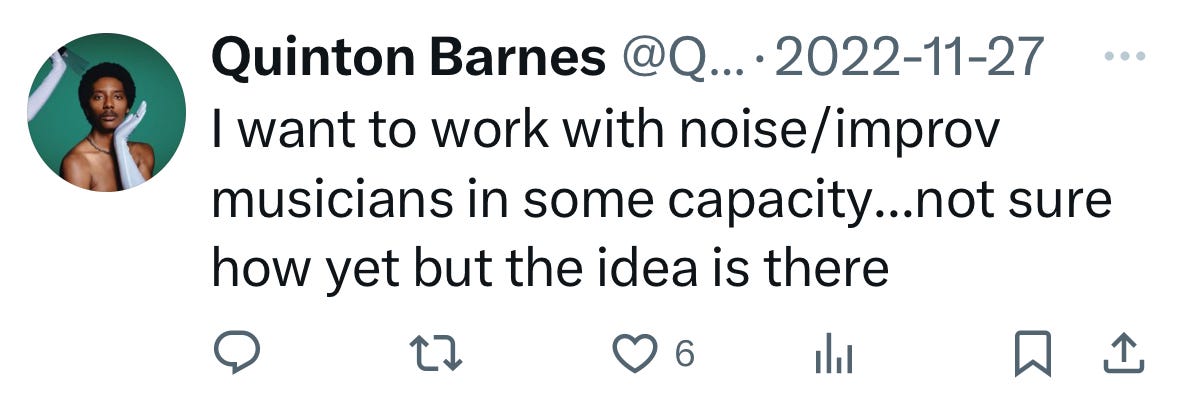Let’s get this out of the way: Black Noise is not an easy listen. It’s not background music to which one folds their laundry or fulfills orders for ceramic jewelry from their Etsy store. Quinton Barnes doesn’t want to soothe the status quo; he wants to shake it—and you—up.
Followers of the Montreal-based/Kitchener-born artist’s earlier work, spanning five albums of genre-blending R&B that dive head-first into chaotic and confrontational soundscapes, may be accustomed to the unexpected bends and turns each subsequent release has taken. Black Noise is undoubtedly in the same lineage as its predecessors, but it’s not a detour. It’s a mission. Drawing from the dense theoretical frameworks of Afropessimism, a philosophy that critically examines the persistent and pervasive nature of anti-Black racism, and the sonic provocations of experimental drone and free jazz, Black Noise is a fearless, often harrowing exploration of Black identity, systemic negation, and the limits of musical form.
And it motherfucking hits.
This is Barnes at his most unfiltered. He’s not just experimenting, he’s dismantling. Black Noise began to take form in 2022 through a tweet Barnes sent out, soliciting collaborations with “noise/improv musicians.” Producer (and ace musician and songwriter in his own right) Michael Cloud Duguay put his hand up. The two connected, eventually pulling in Halifax-based pianist Edward Enman, who wrote a suite of music that Barnes and Duguay then disassembled and reformed as the basis of Black Noise, Barnes’ first release for Duguay’s label, Watch That Ends the Night Records.
The distortion, dissonance, and drone play into the pillars of Afropessimism and do not sugarcoat the realities of Black life under systemic oppression. Black Noise also expertly deploys the absence of sound, moments of eerie calm that feel like the whole record is holding its breath. If it all sounds a little high-concept, it’s because it is. It’s also highly effective and deeply emotional.
The production and performances of Black Noise are dense and volatile, credited to the Black Noise Ensemble, who unleash dissonant synths and brass that clash with freeform percussion while Barnes’ vocals veer from whispered confessions to guttural screams. “Sober for the Weekend” injects punk energy into the mix, while Quiet Noise” and “Movement 7” offer rare moments of melodic reprieve for the fury and fire to subside temporarily. These brief points of clarity allow Barnes and his listeners to come up for air, albeit like surfacing amid an uneasy calm that feels like the eye of a storm that’s about to start spinning once more.
“Art of Survival” is one of the album’s most haunting, riveting, and visceral moments. Its drone is overwhelming; an ominous chorus of distorted voices fills the static as an unseen weight pulls the composition downward. It’s followed by “Black Orpheus,” the album’s nine-minute centrepiece that is theatrical, chaotic, and emotionally exhausting in the best way.
Black Noise doesn’t follow a traditional narrative arc, but there is a palpable movement across its seven songs and 33-minute run time. It lurches from defiance to exhaustion, and seamlessly glides from rage to rebellion, but never once settles for acceptance and surrender. What makes Black Noise so compelling isn’t just its sound; it’s the intent behind it. Barnes isn’t making something pretty. He’s making something true. And in a world where so much music is polished to perfection and devoid of real depth and substance, that kind of honesty hits hard. It’s not an album for everyone, but it needs to be. Black Noise makes you sit with your discomfort and refuses to play by the rules, and refuses to be silenced by the rulers.
It’s messy. It’s brilliant. It’s Quinton Barnes at his unchained best (so far).
the act of just hearing [t]here 🎧
a little more [t]here [t]here 🪩
Not quite the main act, but still on the stage.
Among the many great releases since its inception in 2024, Watch That Ends the Night Records recently added Edward Enman’s We Are Here to their catalogue. Enman is the composer commissioned to write the suite of music that Quinton Barnes and producer Michael Cloud Duguay deconstructed and reasssembled for Black Noise.
We Are Here features improvisational pieces recorded while Eman was working on other projects (one of which would be his work for Black Noise), each recorded in a single take. Enman says, “These recordings were initially never intended to be a collection, but as they were all created in the same creative mission, they fit and live in the same world, with the same once-in-a-lifetime energy. They capture the experience of existing.”
Want to read more about Quinton Barnes? Here are my archival reviews of his work from DOMINIONATED:
AARUPA (2020)
As a Motherfucker (2021)
For the Love of Drugs (2022)
![the act of just being [t]here](https://substackcdn.com/image/fetch/$s_!moQy!,w_40,h_40,c_fill,f_auto,q_auto:good,fl_progressive:steep/https%3A%2F%2Fsubstack-post-media.s3.amazonaws.com%2Fpublic%2Fimages%2Fedc03f78-2893-4045-9600-2bacb96b8fa5_1080x1080.png)
![the act of just being [t]here](https://substackcdn.com/image/fetch/$s_!pLeR!,e_trim:10:white/e_trim:10:transparent/h_72,c_limit,f_auto,q_auto:good,fl_progressive:steep/https%3A%2F%2Fsubstack-post-media.s3.amazonaws.com%2Fpublic%2Fimages%2F0d02a71c-d57a-4a4b-b90c-22191b1e1244_2688x512.png)



